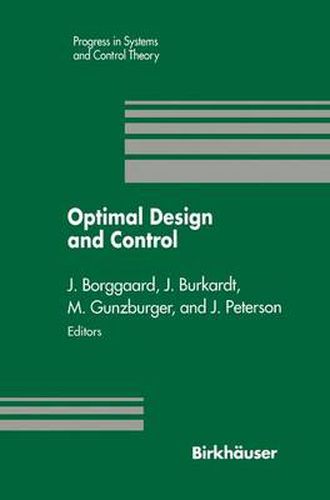Readings Newsletter
Become a Readings Member to make your shopping experience even easier.
Sign in or sign up for free!
You’re not far away from qualifying for FREE standard shipping within Australia
You’ve qualified for FREE standard shipping within Australia
The cart is loading…






This title is printed to order. This book may have been self-published. If so, we cannot guarantee the quality of the content. In the main most books will have gone through the editing process however some may not. We therefore suggest that you be aware of this before ordering this book. If in doubt check either the author or publisher’s details as we are unable to accept any returns unless they are faulty. Please contact us if you have any questions.
This volume is the proceedings of the Workshop on Optimal Design and Control that was held in Blacksburg, Virginia, April 8-9, 1994. The workshop was spon sored by the Air Force Office of Scientific Research through the Air Force Center for Optimal Design and Control (CODAC) at Virginia Tech. The workshop was a gathering of engineers and mathematicians actively in volved in innovative research in control and optimization, with emphasis placed on problems governed by partial differential equations. The interdisciplinary nature of the workshop and the wide range of subdisciplines represented by the partici pants enabled an exchange of valuable information and also led to significant dis cussions about multidisciplinary optimization issues. One of the goals of the work shop was to include laboratory, industrial, and academic researchers so that anal yses, algorithms, implementations, and applications could all be well-represented in the talks; this interdisciplinary nature is reflected in these proceedings. An overriding impression that can be gleaned from the papers in this volume is the complexity of problems addressed by not only those authors engaged in appli cations, but also by those engaged in algorithmic development and even mathemat ical analyses. Thus, in many instances, systematic approaches using fully nonlin ear constraint equations are routinely used to solve control and optimization prob lems, in some cases replacing ad-hoc or empirically based procedures.
$9.00 standard shipping within Australia
FREE standard shipping within Australia for orders over $100.00
Express & International shipping calculated at checkout
This title is printed to order. This book may have been self-published. If so, we cannot guarantee the quality of the content. In the main most books will have gone through the editing process however some may not. We therefore suggest that you be aware of this before ordering this book. If in doubt check either the author or publisher’s details as we are unable to accept any returns unless they are faulty. Please contact us if you have any questions.
This volume is the proceedings of the Workshop on Optimal Design and Control that was held in Blacksburg, Virginia, April 8-9, 1994. The workshop was spon sored by the Air Force Office of Scientific Research through the Air Force Center for Optimal Design and Control (CODAC) at Virginia Tech. The workshop was a gathering of engineers and mathematicians actively in volved in innovative research in control and optimization, with emphasis placed on problems governed by partial differential equations. The interdisciplinary nature of the workshop and the wide range of subdisciplines represented by the partici pants enabled an exchange of valuable information and also led to significant dis cussions about multidisciplinary optimization issues. One of the goals of the work shop was to include laboratory, industrial, and academic researchers so that anal yses, algorithms, implementations, and applications could all be well-represented in the talks; this interdisciplinary nature is reflected in these proceedings. An overriding impression that can be gleaned from the papers in this volume is the complexity of problems addressed by not only those authors engaged in appli cations, but also by those engaged in algorithmic development and even mathemat ical analyses. Thus, in many instances, systematic approaches using fully nonlin ear constraint equations are routinely used to solve control and optimization prob lems, in some cases replacing ad-hoc or empirically based procedures.